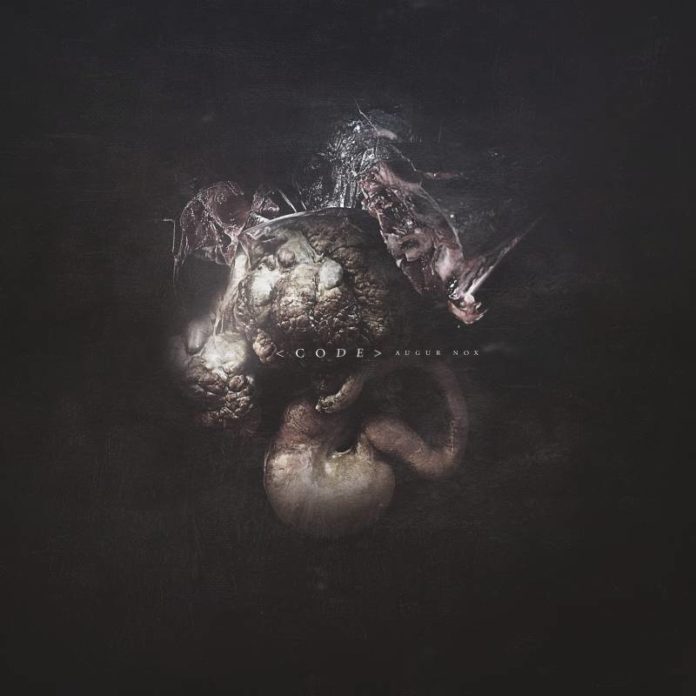I’ll be the first to admit I had never before heard of the UK-based band Code; likewise, their self-described style of music, ‘avant-garde black metal’, had only incidentally featured on the fringes of my artistic consciousness.
So it is perhaps unsurprising that it is only now, after playing the album constantly for a week, that I am starting to get my head around the sounds of Augur Nox, a combination of genres and influences the likes of which I’ve never heard before. Combining industrial/space-rock atmospherics (particularly noticeable in the two interludes, ‘Dx.’ and ‘Rx.’) with an emphasis on melody worthy of Leprous, this is as much ‘dark rock’ as ‘black metal’. Perhaps the best example of this sound is to be found in the tenth track, ‘Trace of God’, a straightforwardly heavy riff-based verse-chorus structure.
Progressive or avant-garde metal always strains against the leash of self-indulgence; the most successful bands are those who are aware of their own boundaries, knowing how and when to push these boundaries. Unfortunately Code, with their emphasis on the melodic, have a tendency to lean toward the operatic and extravagant. At its worst, the music on the album comes across as both overly-ambitious and unmemorable. Especially disappointing are the final two tracks, which rather paradoxically stand out as unexceptional. At over fifty minutes the album begins to outstay its welcome, and would likely be no worse finishing with ‘Trace of God’.
The strongest moments on the album, such as the aforementioned track, are those which tend toward the uncomplicated. Despite struggling with the album’s unfamiliar sound, I eventually realised that in its own way there is a simple enough formula behind it. For the most part, Code succeed in striking a great balance between melody and subtlety, between black metal-tinged primality and rock-tinged infectiousness. Although the album’s ending is somewhat disappointing, the same cannot be said for its opening, the brilliantly bombastic and ballsy ‘Black Rumination’.
This is the first Code album produced with new vocalist Wacian, and although I cannot compare his efforts to previous albums, much of Augur Nox‘s success rests in his impressively diverse performance. Moving between traditional black metal shrieks and fully clean vocals, at times I was even reminded of Tool’s Keenan, surprising for a band working within this genre. Likewise, beyond the vocals the guitarwork points away from the expected, more toward the rockier end of the spectrum – the solo in ‘The Lazarus Chord’ for one is particularly and effectively bluesy.
Despite labelled as ‘avant-garde’, Code are not one of those bands to leap ostentatiously between genres within songs, wearing their influences openly on their sleeves. Instead, Augur Nox demonstrates a mostly successful black metal/rock hybrid, resulting in a compelling and intriguing record. I’ll know to keep my eye out for avant-garde black metal in future.

